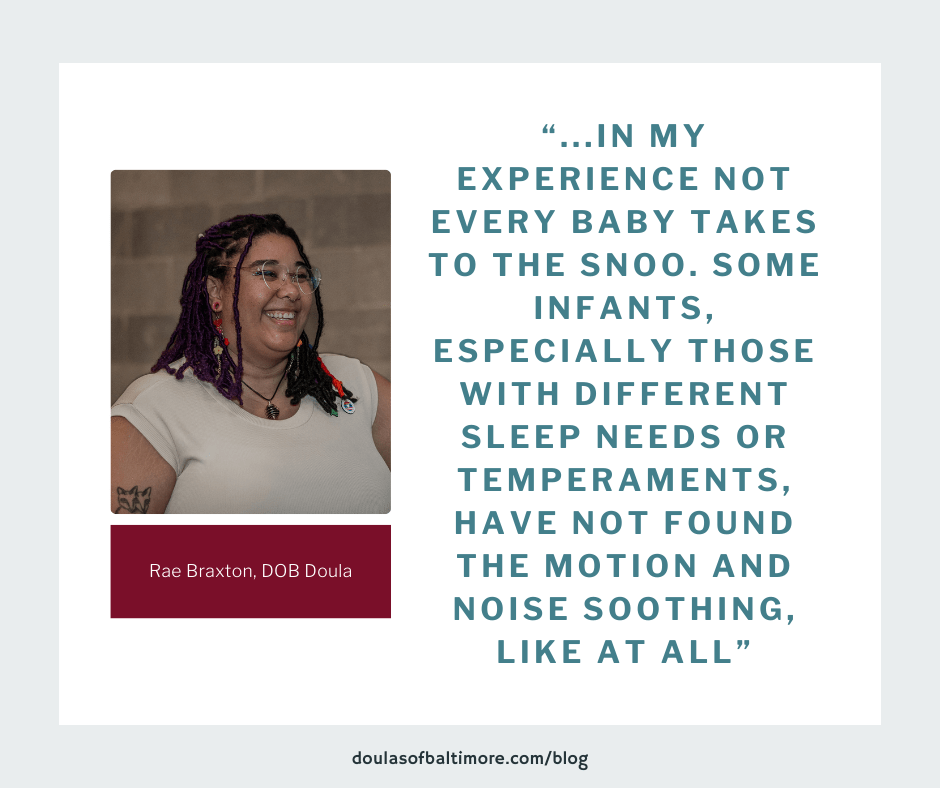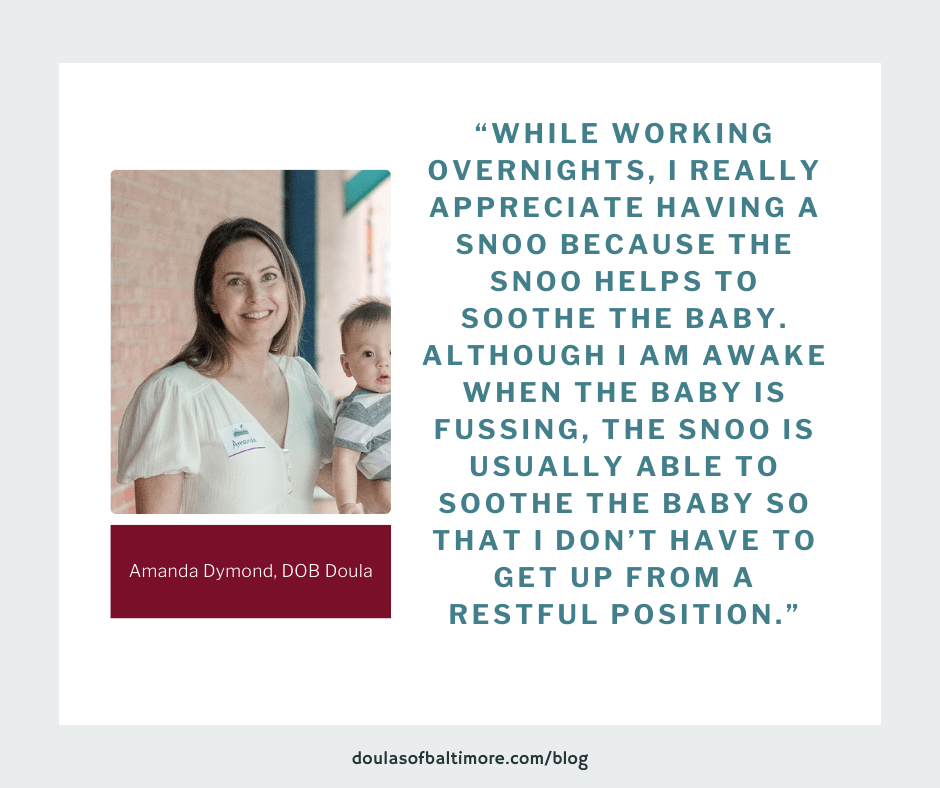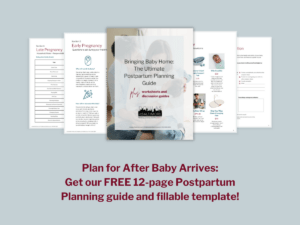With promises of extra sleep, little need to sleep train, and an extra set of hands, the Snoo Bassinet by Happiest Baby is a product we often get questions about. As professional overnight newborn care providers, we have absolutely used this product when families request! Newborn sleep is a hot topic on most new parents’ minds so it makes sense that this is an often requested topic of discussion.
Let’s break down the purported benefits of the Snoo, the standard and optional features, the pros and cons, and what we think overall. Should you buy the Snoo?
Snoo Bassinet promises vs reality
On the sales page for the Snoo you’ll find quite a few benefits outlined. Let’s walk through these and share our experiences with each.
Please note, for this section, these are simply our experiences and not meant to dispute the legitimacy of these claims.
Added Sleep
This really depends on the temperament of your baby. It’s true for some families and less true for others. Some babies really love the movement of swings or bassinets and others hate them. There’s really no way for you to know this without testing it for yourself first.
“…in my experience not every baby takes to the Snoo. Some infants, especially those with different sleep needs or temperaments, have not found the motion and noise soothing, like at all” – Rae Braxton, DOB Doula

Sleep Trains Baby
Kind of. The bassinet does help soothe some babies back to sleep from the wakeful part of their sleep cycle. Adult sleep cycles last between 90-120 minutes while a baby’s is more like 40. They also wake during the night because their stomachs are smaller. During their more active part of their sleep cycle, it’s normal for them to make noise and move around sometimes resulting in them waking up. The Snoo detects this movement and soothes them back to sleep. Transitioning out of the Snoo can be simple or could be difficult, again depending on your baby’s unique needs.
Your 24/7 Helper
While it is true that your baby can go into the bassinet while you shower, as the website claims, they could also simply be put down to nap and you take a shower. So long as your baby is in a safe space, they can be put down anywhere. As Postpartum Doulas, we also know that extra hands to help with snack prep, light cleaning, and laundry are also invaluable. You don’t always want to put your baby down, sometimes you just need hands to do the tasks you can’t get to while you’re holding the baby.
Responsive
We can confidently say that the Snoo Bassinet is definitely responsive. When it senses that baby is fussing, it activates shushing and/or movement to soothe them back to sleep.
“While working overnights, I really appreciate having a Snoo because the Snoo helps to soothe the baby. Although I am awake when the baby is fussing, the Snoo is usually able to soothe the baby so that I don’t have to get up from a restful position.” – Amanda Dymond, DOB Doula

Mobile App
Yes, we can confirm there is a Snoo App and it has lots of interesting information. The main thing it does is compile information and in our experience is limited in functionality.
“…I think the app integration works well for more tech savvy parents and caregivers. (The app is not very intuitive but if they like compiling data, it would work well for their needs)” – Rae Braxton, DOB Doula
Added Safety
The claim is that because the swaddle is secure it prevents the baby from rolling into an unsafe position. This one is a tricky one to assess because most swaddles keep your baby in the position they’re in and once your baby is attempting rolling they shouldn’t be in a swaddle anyway. We can definitely confirm the Snoo will keep your baby in their spot while in the bassinet.
Calms Fussing
Much like the added sleep claim, this one is very subjective. If your baby finds the Snoo to be relaxing and soothing, yes! It will definitely calm the fussing. If, however, your baby finds it to be stimulating, it’s unlikely to calm the fussing.
“… it really depends on the temperament of the baby. Some find the automated motion calming, while it can stimulate other babies. “ – Lani Cohen, DOB Doula
Key Snoo Bassinet Features
This bassinet offers a host of features that parents may love to offer their new babies.
Directly from the Happiest Baby website:
“Breathable mesh walls for healthy air flow
5 levels of specially designed sound + motion to soothe babies and boost sleep
Premium motor for quiet and reliability
Advanced algorithm can tell baby cries from room noise
For babies 0-6 months old who cannot roll over consistently
(meaning they have rolled from stomach to back—multiple times—during sleep)”
Sleep Sack Sizing and Snoo Sheets
According to the website, the sizing for the swaddles looks like this:
Small: 5-12 lb
Medium: 12-18 lb
Large: 18-26 lb
X-Large: 26-33 lb
We can attest that these swaddles do run a little small as they’re intended to be snug. There are only 3 included with your purchase: one small, one medium, and one large. This means if your baby happens to have a blowout or spit up on their swaddle you’ll need to wash it quickly before their next nap or purchase additional swaddles in their size. One swaddle will run you $44.95 or you can purchase a set of three for $73.40.
This also goes for the Organic Cotton Snoo Sheets as your bassinet purchase only comes with one. The sheets can be purchased individually for $19.95 or a set of three for $38.50.
Snoo Weight Limit
The Snoo’s weight limit is 25 lbs. Beyond weight, parents should also be aware that babies should not be using the Snoo if they are rolling consistently and definitely not if they can get up on hands and knees.

Pros and Cons of the Snoo Bassinet
Pro: This smart bassinet may help your baby sleep better, getting parents additional sleep that may help aid in warding off things like Postpartum Depression, for which sleep disturbances are a risk factor, and delayed healing.
Con: There’s no way for you to know if your baby will actually like this device besides investing the money to try it.
Pro: This bassinet is great for babies who enjoy being swaddled up for sleep.
Con: That means you may end up retiring this bassinet as soon as 2 months when your baby begins to try rolling over. That’s a potentially very short period of time.
Pro: You get 9 months of premium access to the Snoo Subscription app that accompanies the bassinet when you purchase or subscribe to a Snoo Bassinet Rental through an authorized dealer or Happiest Baby themselves.
Con: If you use that app primarily as your tracker for baby you will have to pay after that 9 month period of time or spend time transferring data out of the app.
Pro: You can rent it at a lower rate than purchasing it.
Con: If you end up keeping it past a couple months it might end up being more expensive anyway with the added fees and taxes, plus you can’t keep it to use with any future babies if that is your plan.

So, should you purchase a Snoo Bassinet?
As with so many other parenting choices you’ll make that depends on your baby. A quick search of the message boards on a website like Reddit will yield many varied results and some insights that might help make the decision based on real-life reviews of the product.
Overall, we think this product can be very useful in some situations. Being that there is the possibility that you don’t use it past 2 months of age, the up front investment is very high, and it’s a case-by-case product, we highly recommend renting or borrowing one to see what you think before diving into purchasing it.
“My advice is to always try renting before making the full commitment! It really can be a fantastic tool and help parents get the sleep they need—but it’s definitely not one size fits all. “ – Rae Braxton, DOB Doula
Should you choose to move forward with the Snoo, we highly recommend purchasing additional swaddles and sheets to ensure you have at least one backup in case your little one soils them.
A useful tool for some, an expensive waste of money for others, the Snoo Bassinet is a purchase you won’t find a definitive answer on!













